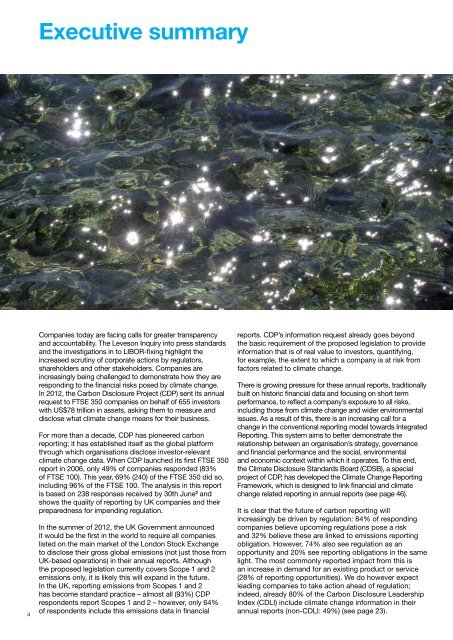CDP-FTSE-350-Climate-Change-Report-2012
CDP-FTSE-350-Climate-Change-Report-2012
CDP-FTSE-350-Climate-Change-Report-2012
Create successful ePaper yourself
Turn your PDF publications into a flip-book with our unique Google optimized e-Paper software.
4<br />
Executive summary<br />
Companies today are facing calls for greater transparency<br />
and accountability. The Leveson Inquiry into press standards<br />
and the investigations in to LIBOR-fixing highlight the<br />
increased scrutiny of corporate actions by regulators,<br />
shareholders and other stakeholders. Companies are<br />
increasingly being challenged to demonstrate how they are<br />
responding to the financial risks posed by climate change.<br />
In <strong>2012</strong>, the Carbon Disclosure Project (<strong>CDP</strong>) sent its annual<br />
request to <strong>FTSE</strong> <strong>350</strong> companies on behalf of 655 investors<br />
with US$78 trillion in assets, asking them to measure and<br />
disclose what climate change means for their business.<br />
For more than a decade, <strong>CDP</strong> has pioneered carbon<br />
reporting; it has established itself as the global platform<br />
through which organisations disclose investor-relevant<br />
climate change data. When <strong>CDP</strong> launched its first <strong>FTSE</strong> <strong>350</strong><br />
report in 2006, only 49% of companies responded (83%<br />
of <strong>FTSE</strong> 100). This year, 69% (240) of the <strong>FTSE</strong> <strong>350</strong> did so,<br />
including 96% of the <strong>FTSE</strong> 100. The analysis in this report<br />
is based on 238 responses received by 30th June 2 and<br />
shows the quality of reporting by UK companies and their<br />
preparedness for impending regulation.<br />
In the summer of <strong>2012</strong>, the UK Government announced<br />
it would be the first in the world to require all companies<br />
listed on the main market of the London Stock Exchange<br />
to disclose their gross global emissions (not just those from<br />
UK-based operations) in their annual reports. Although<br />
the proposed legislation currently covers Scope 1 and 2<br />
emissions only, it is likely this will expand in the future.<br />
In the UK, reporting emissions from Scopes 1 and 2<br />
has become standard practice – almost all (93%) <strong>CDP</strong><br />
respondents report Scopes 1 and 2 – however, only 64%<br />
of respondents include this emissions data in financial<br />
reports. <strong>CDP</strong>’s information request already goes beyond<br />
the basic requirement of the proposed legislation to provide<br />
information that is of real value to investors, quantifying,<br />
for example, the extent to which a company is at risk from<br />
factors related to climate change.<br />
There is growing pressure for these annual reports, traditionally<br />
built on historic financial data and focusing on short term<br />
performance, to reflect a company’s exposure to all risks,<br />
including those from climate change and wider environmental<br />
issues. As a result of this, there is an increasing call for a<br />
change in the conventional reporting model towards Integrated<br />
<strong>Report</strong>ing. This system aims to better demonstrate the<br />
relationship between an organisation’s strategy, governance<br />
and financial performance and the social, environmental<br />
and economic context within which it operates. To this end,<br />
the <strong>Climate</strong> Disclosure Standards Board (CDSB), a special<br />
project of <strong>CDP</strong>, has developed the <strong>Climate</strong> <strong>Change</strong> <strong>Report</strong>ing<br />
Framework, which is designed to link financial and climate<br />
change related reporting in annual reports (see page 46).<br />
It is clear that the future of carbon reporting will<br />
increasingly be driven by regulation: 84% of responding<br />
companies believe upcoming regulations pose a risk<br />
and 32% believe these are linked to emissions reporting<br />
obligation. However, 74% also see regulation as an<br />
opportunity and 20% see reporting obligations in the same<br />
light. The most commonly reported impact from this is<br />
an increase in demand for an existing product or service<br />
(28% of reporting opportunities). We do however expect<br />
leading companies to take action ahead of regulation;<br />
indeed, already 80% of the Carbon Disclosure Leadership<br />
Index (CDLI) include climate change information in their<br />
annual reports (non-CDLI: 49%) (see page 23).


